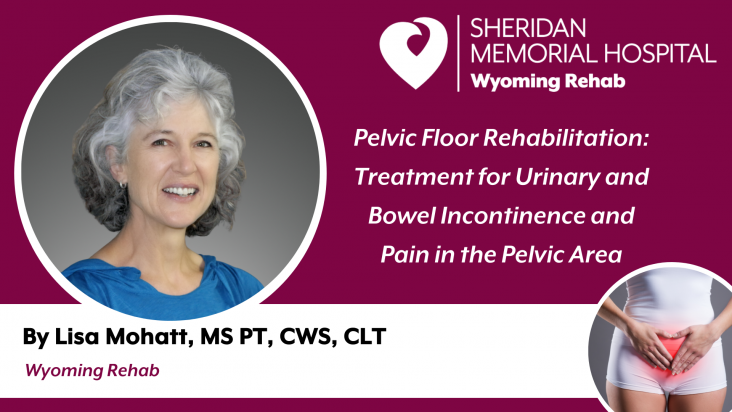By Lisa Mohatt, MS PT, CWS, CLT, Physical Therapist with Sheridan Memorial Hospital’s Wyoming Rehab
The term “Pelvic Floor Health” encompasses several important functions. It relates to urinary and bowel dysfunctions, including incontinence, pain anywhere in the pelvic area, pain or problems during and after pregnancy, and problems related to prostate cancer and surgery in men.
Urinary incontinence affects over 200 million people worldwide and is considered a public health problem. “Stress Urinary Incontinence” can result from weak muscles in the bottom of the pelvis – the pelvic floor muscles – that are not strong enough to withstand sudden increases in abdominal pressure, such as with coughing, sneezing, jumping, and other exertions. “Urge Urinary Incontinence” occurs before a person is able to reach the bathroom, usually before a strong urge is felt. Eating and drinking a lot of bladder irritants and not enough water, as well as overtight pelvic floor muscles, can cause this incontinence. Some people may have one or both of these types of incontinence, referred to as “Mixed Urinary Incontinence.” Physical therapists trained in pelvic health can determine the underlying factors of each type of incontinence by assessing lifestyle, medical history, and musculoskeletal factors and tailor a program accordingly. Most patients find this rehab extremely effective, empowering them to have control over a problem previously thought of as “normal” after a certain age, surgery, or childbearing.
Pelvic pain affects up to 25% of women in their lifetime. This type of pain affects primarily younger women and then women around menopause and can be from many different causes. Physical therapists trained in treating pelvic pain will look at past medical history, lifestyle, posture/ergonomics, and any contributing musculoskeletal factors. Many women avoid seeking help with pelvic pain since it can be debilitating, frustrating, life-changing, and emotional. Physical therapy can help with a private, individualized program that aims to help women gain control over this pain and be able to self-manage or eliminate it.
Bowel dysfunctions, specifically fecal incontinence, can affect up to 15% of people and up to a whopping 46% in nursing homes. Most people do not discuss this with their physicians unless directly asked due to embarrassment. Pelvic health physical therapists trained in bowel dysfunctions can help minimize this embarrassing issue with sensory training, pelvic floor muscle training/strengthening, behavioral modifications, dietary education, and other strategies aimed to increase awareness and control.
Lastly, benign prostate hypertrophy, prostatitis, and prostate cancer can all lead to urinary incontinence and erectile dysfunctions. This can affect up to 44% of men in the U.S. Physical therapy can help with pelvic floor muscle training, modalities to encourage muscle contractions, lifestyle/behavioral changes, education and use of external devices, as well as education before any surgical interventions.
Pelvic health physical therapy plays a role in a multidisciplinary team approach to treating pelvic problems in both women and men. It’s important to realize that treatment for pelvic problems is available and can be very effective and empowering.
Ask your medical provider for a referral to Wyoming Rehab to start managing this today! Or give us a call at 307.674.1632 to find out more.

